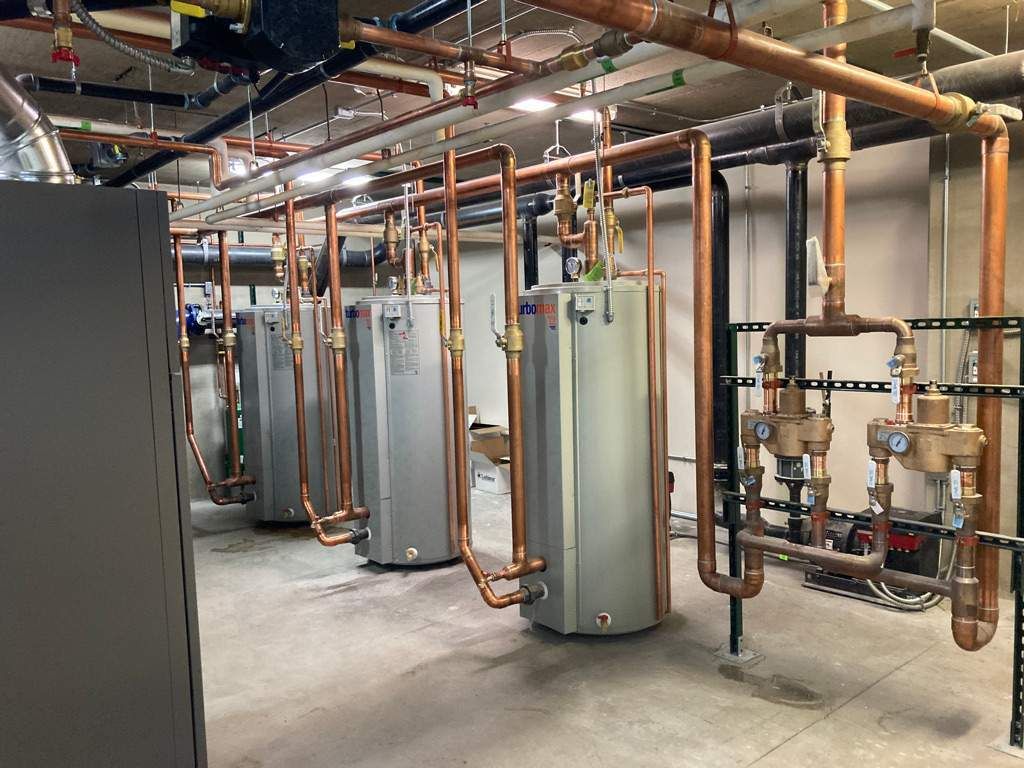Domestic hot water systems in Denver
High recovery solutions for busy homes

Hot water is central to everyday comfort. Advanced Hydronics designs domestic systems that pair efficiency with reliability, using boilers, tanks, or heat pumps to deliver steady performance through every shower, kitchen task, and laundry cycle. We size and configure each system to match household demand, ensuring fast recovery, quiet operation, and long service life.
Indirect Water Heaters
Reliable, high-capacity hot water
Indirect water heaters use the boiler’s energy to heat domestic water through an internal coil. They recover quickly and maintain temperature with excellent efficiency since standby losses are low. This setup is ideal for families who want consistent hot water for busy mornings without adding electric elements or separate gas burners. Learn More About Indirect Water Heaters
Reverse Indirect Water Heaters
Integrated heating and hot water in one tank
Reverse indirects store boiler water in the tank and heat domestic water through an internal heat exchanger. This design simplifies piping and reduces short cycling. It’s a compact, efficient option that works well in smaller mechanical rooms or multi-zone systems.
Combi Boilers
Compact, dual-purpose comfort
Combi boilers provide both space heating and domestic hot water from a single appliance. They’re an efficient solution for smaller homes or accessory units where space is limited. When properly sized and installed, they deliver steady temperature and reliable heating performance year-round.New Paragraph
Heat Pump Water Heaters
Energy-efficient hot water with lower emissions
Heat pump water heaters use electricity to move heat from the surrounding air into the tank, reducing energy use and carbon footprint. They can operate as standalone units or integrate with hybrid hydronic systems for greater efficiency. A good fit for households focused on all-electric performance and sustainability.
Choosing the Right Domestic Hot Water System
Selecting the right hot water system depends on how your home uses water, the available space, and your existing heating equipment. Advanced Hydronics designs systems that strike a balance between efficiency, comfort, and recovery rate. Each installation is sized and configured to match your fixtures, usage patterns, and long-term comfort goals.
Getting the Right Hot Water for Your Home
How do I know which type of water heater is right for my home?
It depends on your household’s hot water demand, available space, and existing heating system. We’ll evaluate usage patterns, mechanical room layout, and energy goals to recommend an indirect, combi, or heat pump setup that fits your needs.
Do indirect water heaters save energy?
Yes. Indirect tanks use the boiler’s efficiency to heat domestic water, reducing standby losses and avoiding the need for separate burners or elements. When paired with a high-efficiency boiler, they deliver quick recovery and long service life.
What’s the difference between an indirect and a reverse indirect water heater?
An indirect tank heats domestic water inside the tank using boiler water through a coil, while a reverse indirect stores boiler water and heats domestic water through an internal heat exchanger. The choice depends on your system layout, efficiency goals, and available space.
Can I replace my tank water heater with a tankless?
Often yes. Tankless water heaters are ideal for smaller homes or remodels where space is limited. We size and configure them carefully to ensure hot water demands are met without temperature fluctuations.
Are heat pump water heaters a good option in Colorado?
They can be. In basements or utility areas that stay above freezing, heat pump water heaters work efficiently year-round. We consider altitude, climate, and ventilation to ensure reliable performance and energy savings.
What maintenance is required?
Annual inspection is recommended. We check boiler performance, tank temperature controls, and relief valves, and verify that heat exchangers and circulators are functioning properly. Keeping water chemistry balanced also helps prevent corrosion and scaling.
Do tankless systems require gas line upgrades?
Usually. Tankless units often need higher gas flow than standard tank water heaters. We evaluate the existing gas line, meter, and venting during design to confirm proper sizing and ensure safe, reliable operation.
